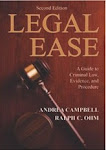Just recently this commentary was posted in an online e-newsletter I receive every day, Levine Breaking News. Here is the copy:
*LBN-COMMENTARY By Scott Turow: This Friday a 33-year-old man named Juan Luna will go on trial for the murder of seven people in a Brown's Chicken restaurant in Palatine, Ill., on Jan. 8, 1993. The investigation of the murders, in which the victims' bloody corpses were discovered in the restaurant freezer, languished for more than a decade until Mr. Luna's DNA was identified in the saliva found on a chicken bone at the crime scene. Having spent some time over the years as a criminal defense lawyer, I find this use of DNA evidence somewhat ironic, even a bit perverse. When I was first exposed to the forensic use of DNA, in the late 1980s and early 1990s, it was seen largely as a tool of the defense, usually resisted by prosecutors who feared manipulation of the underlying science. Ultimately, hundreds of people around the country were able to demonstrate they had been wrongly convicted, and those successes led prosecutors to realize that the same DNA tests -- and experts -- could also provide evidence that guilty people had been walking around free for years. The Brown's Chicken case is but one of hundreds of "cold cases" now being resolved by advances in forensic technology, particularly DNA testing. Greater accuracy in the truth-finding process is a laudable development. But I worry that the growing capacity of today's forensics to reach farther and farther into the past seems likely to undermine the law's time-ingrained notions, embodied in statutes of limitations, about how long people should be liable to criminal prosecution.
As much as I love Scott Turow and respect his work and his writings, I must humbly disagree with his premise. The statute of limitations never runs out on murder. And for good reason: a life has been taken and this egregious act means that a father will no longer be there for his family; that a daughter will never grow up to have her own family; and, that a victim’s family must live with the absence of a loved one every day of their lives.
I understand going back into history and plucking criminals out of their new lives must be a shock, and upsetting to his new family. Oh, well. He should have thought about this before he decided to divorce himself from personal responsibility and moral conduct.
Your view?
p.s. Please visit my new blog along with some other great true-crime authors and commentators, it's sure to be a hit: http://www.incoldblogger.blogspot.com
Tuesday, June 12, 2007
Subscribe to:
Posts (Atom)




